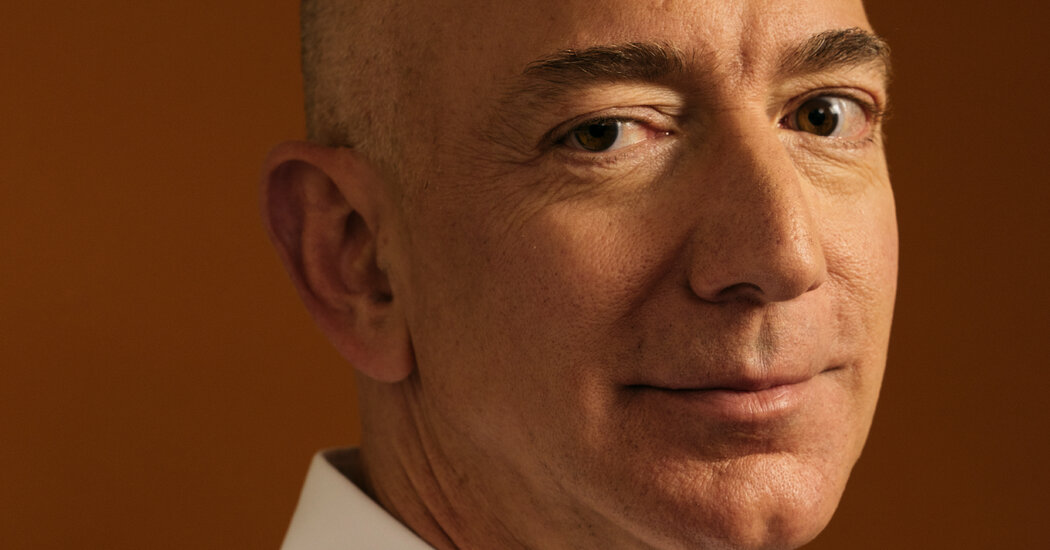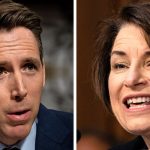
AMAZON UNBOUND
Jeff Bezos and the Invention of a Global Empire
By Brad Stone
After I finished “Amazon Unbound,” I glanced at the sleek black Amazon Echo cylinder sitting on my kitchen counter, right next to a few cans of dog food that had just arrived from Amazon. Instead of the device, I imagined before me the equally sleek, smoothly bald and evenly tanned face of Jeff Bezos himself, eyes peering serenely back at me from below the glowing LED halo.
That minor hallucination made a kind of sense because — as we learn from Brad Stone’s new portrait of Amazon and its founder — Alexa, the voice coming out of my Echo, more or less is Jeff Bezos. He came up with the idea of a smart speaker in January 2011, back in the era of Google Plus and the iPod Shuffle. Bezos emailed his top deputies that month and declared, “We should build a $20 device with its brains in the cloud that’s completely controlled by our voice.”
For the next nearly four years, he obsessively micromanaged the project, pushing teams in Atlanta and Gdansk to make speech recognition seamless. He put in place a surreal testing protocol that involved hiring temps to spend days in empty apartments chattering away to silent speakers, and berated executives who told him it would take decades to develop speech recognition. He took home an early Echo prototype and when, in a moment of frustration, he told it to go “shoot yourself in the head,” it sent a wave of panic through the engineers who were listening in. He even came up with the idea for the LED ring on top, Stone writes, and with the name “Alexa” (in homage to the ancient library of Alexandria).
Stone’s new volume is on its surface a business book that seeks to explain the rise of America’s most important private enterprise, a giant company also notable for its opacity. In that sense, it is a sequel of sorts to his 2013 best seller, “The Everything Store,” which introduced Bezos and explained his relentless and single-minded drive to take over online commerce. “Amazon Unbound” is particularly valuable in explaining how the company makes money, and the day-to-day decisions that end up having a big effect on consumers: Is it worth it, for example, to sell pallets of bottled water, with their low cost and expensive shipping?
Stone looks at turning points in Amazon’s history, like the failure of the Fire phone and the rise of Amazon Web Services, its internet hosting division, as the engine of the company’s financial success. This is the inside story, a kind of corollary to the outside one Alec MacGillis recently sketched in “Fulfillment,” his grim look at how the country has become atomized by Amazon’s economic model. I was, though, left wishing at times for a third book that made a tighter connection between the inside of the juggernaut and its effects on the world.
“Amazon Unbound” shows how the company increasingly wields its enormous scale against potential rivals. After acquiring a key robot manufacturer, for instance, it stopped shipping the machines to competitors. And it used its vast trove of data from third-party Amazon vendors to make competing “private label” products, then simply lied about it.
Significantly, the book is also very much a biography of Bezos. And that makes it timely at a moment when our economy is dominated by giant firms headed by a small handful of men, whose personalities and whims we need to understand whether we like it or not. Amazon in the 2010s was an intensely personal venture, run by one of the wealthiest men in the world according to his own desires and reflecting his own personality. Bezos has recently announced he will be stepping down as CEO before the end of the year, though he will clearly retain some guiding role as the company’s executive chairman.
As biography, the book is both limited and perhaps strengthened by the fact that Stone has lost his former access to Bezos, whom he did get a chance to interview for “The Everything Store.” Stone writes that he later learned the C.E.O. was angry he had tracked down his biological father for that book. (MacKenzie Scott, Bezos’ wife at the time, gave “The Everything Store” a one-star review on Amazon.)
There’s an old journalistic saying that access is a curse, because it puts the author in debt to his source and brings him too close to the person he’s covering. It’s safe to say that “Amazon Unbound” does suffer at times from a lack of psychological insight into Bezos. But it benefits from the author’s distance, and makes for a dense, at times juicy tour of the company Bezos built. Like Alexa, Amazon as a company seems to embody some of Bezos’ best personal qualities (his relentless drive to get you that package on time) and his worst (an “informal cruelty” that defines his company’s culture and requires that his factory workers and executives make personal sacrifices for corporate needs).
At Amazon, nearly every big decision comes down to a meeting with Bezos, at which his deputies hold their breaths, genuinely uncertain of whether he will berate them and tear up their proposals, or double their planned budgets. Some of his fixations, like his determination to create a smart speaker, are visionary. Others are quirky: After reading that a single hamburger can contain meat from a hundred different cows, he decided that Amazon’s fledgling grocery business would distinguish itself by offering a “single-cow burger.” Once his aides got past thinking their boss was joking, they set to work. A few months later, the product manager got another email from Bezos: He was having trouble opening the packaging, and the burger had dripped too much fat onto his grill.
It was, Stone writes, “a different style of innovation,” in which employees “worked backwards from Bezos’ intuition and were catering to his sometimes eclectic tastes (literally).”
On a far larger scale, Stone solves some of the mystery behind Amazon’s HQ2 debacle, in which the company announced plans to build a giant new office complex in Queens, then pulled out in the face of local opposition. That New York City was even a possibility was the result of a decision by Bezos to throw out months of careful study — which had narrowed the choices down to Chicago, Philadelphia and Raleigh — and go instead with his gut.
One of the last-minute additions to the plans, and the ultimate symbol of corporate greed to local foes, were the helipads. Bezos himself once hated helicopters, but all of a sudden they were cropping up everywhere. And it was during this period that he’d grown close to a former actress named Lauren Sanchez, a charismatic pilot who now ran an aviation company.
Bezos is at his most human in the sections where Stone describes how he fell for Sanchez, throwing caution to the wind and courting her so publicly that he was sure to get caught. Stone has the incredible emails between a National Enquirer reporter and her source, who first promised to expose the relationship between a “B-list married actress” and a “Bill Gates type.” The source turned out to be Sanchez’ own brother, a true piece of work who played all angles and insisted to the last that he’d “never sell out anyone.”
So it’s hard not to root for Bezos when, trapped by The Enquirer, he lures the publication into sending him a menacing letter — then cheekily publishes it and exposes the minor scandal himself.
But Bezos isn’t just your average victim of tabloid extortion. He’s the richest man in the world, and has recently fashioned himself as a champion of uppercase “Truth” and “Democracy” by saving The Washington Post. Bezos speculated publicly on the possible political motives behind the revelation of his affair, Stone writes, and tried to shift attention away from the tawdriness and toward the brutal murder of the Post columnist Jamal Khashoggi. The Post purchase had been a “complexifier” in his public life, Bezos himself once wrote, causing “powerful people” to consider him an “enemy.”
Stone’s reporting makes clear that this was, at best, reasonable paranoia; and at worst, a truly cynical bit of public relations, cashing in on a journalist’s murder to distract from a tabloid scandal. His “noble sentiment,” Stone comments dryly, “had little to do with his yearlong open conduct of an extramarital relationship.” Bezos’ wealth and power will always protect him, but there’s a flip side, too: They can also taint anything he touches.




